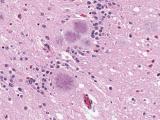Jul 28, 2005 (CIDRAP News) About 100 people who gave blood to three people in Britain who later fell ill with variant Creutzfeldt-Jakob disease (vCJD) are being warned that they may have an increased risk of carrying the vCJD agent.
The blood donors are being asked not to donate blood, tissue, or organs and to tell health professionals about their status so that extra precautions can be taken if they have surgery or invasive procedures, the United Kingdom Department of Health announced last week. The fatal disease is the human equivalent of bovine spongiform encephalopathy (BSE), or mad cow disease.
It is not known if any of the vCJD victims contracted the disease because of a blood transfusion, but the decision to warn the donors was based on a detailed risk assessment and the advice of two expert committees, the agency said.
"When a recipient of a blood transfusion goes on to develop vCJD, we have to consider the possibility that the infection could have been passed on through the transfusion," Chief Medical Officer Sir Liam Donaldson said. "Until a reliable blood screening test becomes available, it is sensible to proceed with highly precautionary measures such as this to rule out any possibility of onward transmission of the disease."
Officials said the likelihood of actual vCJD developing in someone carrying the agent is uncertain and that an infected person might never become ill.
The first possible connection of a vCJD case with a blood transfusion was reported in Britain in December 2003. To date, 4 of 156 vCJD victims had blood transfusions that experts think might have contributed to their disease, the department said. The probable source of infection was identified in one case, because one of the blood donors later became ill with vCJD.
Officials said the National Blood Service was sending letters to the blood donors, with a telephone number for a help line staffed by senior transfusion experts. All the donors living in England gave blood in 1993, the announcement said.
Dr. Angela Robinson of the Blood Service said, "If you have donated blood in the last five years and are not contacted shortly, you can be assured that you are not involved in this new safety measure and need to take no further action."
Since 1997 British health agencies have take a number of steps to guard the blood supply from the vCJD agent. Starting in 1999, for example, all white blood cells were removed from blood used for transfusions, and last year agencies stopped taking blood from anyone who had received a transfusion since 1980.
People contract vCJD mainly by eating beef contaminated with BSE, which spread through British cattle herds in the 1980s and 1990s.
See also:
Dec 19, 2003, CIDRAP News story "Blood transmission of vCJD suspected in Britain"

















